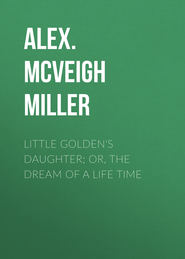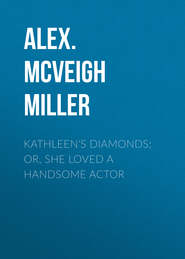По всем вопросам обращайтесь на: info@litportal.ru
(©) 2003-2024.
✖
Pretty Geraldine, the New York Salesgirl; or, Wedded to Her Choice
Настройки чтения
Размер шрифта
Высота строк
Поля
"I must touch briefly now on a subject painful to us both—your father's faithlessness."
"Oh, mamma, how could he be false to one like you—so noble, so beautiful?" cried Geraldine, in wonder.
"He was weak and easily flattered by a designing woman—that is all I will say, Geraldine, for how can I disparage an erring father to his child? Well, while I remained at my cousin's in Devonshire, my husband kept running back and forth to Paris, seeming infatuated by its charms. At length a rumor reached me that he was lavishing money and attention on a notorious woman who had caught his fancy. I wrote to him, begging that he would deny it, but he treated my letter with disdain, plunging more recklessly into dissipation, and even appearing in public by the side of the woman who had lured him from me, seated in a magnificent vehicle he had purchased for her use. To be brief, Geraldine, his vile conduct killed every spark of love I ever had for him. I returned to my home in New York and secured a divorce as soon as possible, encouraged by my father, who was then living. But he died in a few months, and afterward I was very lonely, having no near relatives to cheer me except you, my pet and darling. At a watering-place I met Mr. Fitzgerald, and a mutual fascination for each other was followed by an early marriage. Soon after our return from our bridal tour, your father—enraged, perhaps that I could find happiness with another—came to Chicago and stole you away. A cruel fate foiled all my efforts to trace you, until that day when chance brought us face to face."
"Do not call it chance, mamma; it was Providence, surely, that saved me from that wretch!" cried pretty Geraldine, fervently.
"We will call it Providence, then," agreed her mother, and continued: "Until the last few years, when my heart and thoughts were all occupied by your step-father's failing health, I kept up a regular correspondence with my cousin, Lady Putnam, and her letters were filled with praises of her noble son, Leland. She had a sweet little daughter also, called Amy, but her pride seemed to centre in the boy who would inherit his father's rank and wealth."
She paused, sighed, then added:
"Now, Geraldine, you see how I had planned your future before you were so cruelly stolen from me. And now that you have been restored to my heart, all my old ambitions for you have revived. Can you wonder that I prefer for you to marry noble Leland Putnam, whom I have known and loved ever since his childhood, rather than a stranger, who, however worthy, is poor and obscure, and could not elevate you to the position your beauty merits?"
Geraldine had listened silently and earnestly. The romantic story of her childish betrothal pleased her, but it could not turn her true heart from its firm allegiance.
She said, gently:
"You have told me a deeply touching story, dear mamma. I grieve that my own father proved so false and unworthy, and I rejoice that I did not inherit his fickleness, for my heart is true as steel to the first object of its choice. I can never cease to love Harry Hawthorne, and as for the betrothal you speak of, it was simply a childish affair, forgotten, no doubt by all but yourself."
"You are mistaken, my dear; for my cousin often mentioned it in her letters after you were lost to us, as we feared, forever. I shall write to her this very day, and tell her you are found again."
"But not one word of that childish engagement, please, mamma! I will not be offered to any man!" remonstrated Geraldine, in alarm.
"Certainly not, Geraldine. Of course, I know what is due to you. But if Leland revives it of himself, if he still claims you, you cannot refuse to marry him!"
Geraldine felt as if she were choking.
A cruel fate seemed to destine her to a loveless marriage.
Oh, how could her mother be so cruel, so heartless, wrapped up in sordid ambition, reckless of a young heart's misery!
Filled with fear and anger at her threatening fate, she sprang to her feet, crying, passionately:
"Mamma, I do not wish to offend you, but—but—I will not be forced into a loveless marriage. I will be true to Harry, though the whole world oppose me! Why, I would rather have remained a poor salesgirl forever than have lost him, my own true love, by finding myself an heiress!"
The passionate defiance was out, and the mother knew that all her ambitions were likely to be defeated by a girl's perversity.
She called it perversity in her mind. She would not own that it was love—constant, faithful love, that has been the theme of poets since first they struck the sounding lyre.
She did not want to excite the girl any further now, though she determined that in the end she should yield to her mother's will.
Rising from her seat, she quitted the room like a skillful general, though casting one single glance backward that rankled reproachfully in Geraldine's heart.
CHAPTER XXXVII.
"A WOMAN'S HONOR IS INVOLVED, AND MY SILENCE IS ITS ONLY SAFEGUARD."
"Woman's honor is nice as ermine—
Will not bear a soil."
"Her maiden pride, her haughty name,
My dumb devotion shall not shame;
The love that no return doth crave,
To knightly levels lifts the slave."
When Clifford Standish plunged the dagger into Hawthorne's breast, and heard the groan of the victim, felt the hot blood spurting over his hands as he rolled over in the snow, he thought he had killed him.
But no pang of remorse touched his cruel heart.
He exulted in the deed that he had done.
Springing to his feet, he glanced hurriedly around, and seeing no one near, coolly wiped his bloody hands on Hawthorne's overcoat, and hastened away, exclaiming:
"I am rid of my dangerous rival at last!"
But there had been an unsuspected witness of the deadly crime he had committed.
From a window above a young man had been looking down just as the rivals closed in mortal combat.
He had come to the place to call on a friend who roomed there, and learned that he was out, but was told that he would be in directly.
Without removing his hat and overcoat, he walked restlessly up and down the room, and at last became so impatient that he pushed up the window and looked out to see if his friend was yet in sight.
But the narrow street, its snowy expanse lighted by the flaring electric lights, was deserted, save by two men, who hurled themselves with tremendous force against each other in deadly conflict.
Mr. Hill was not alarmed at first. He smiled, and murmured, whimsically:
"Whew! A prize-fight! I bet on the one that whips!"
Oblivious of the cold air that rushed through the open window into his friend's warm steam-heated apartment, he leaned out and watched the contest, adding:
"I don't suppose they would thank me for spoiling their sport, so I won't interfere. It's the blue-coat's business to break it up, but they're never in place when needed."
The battle went on, and the unseen witness gazed admiringly at the well-pitted antagonists.
He was a jovial young fellow, and he really felt inclined to cheer the gallant athletes, so cleverly did they handle each other.
But he restrained his inclination, and continued his watching, and wondering who the combatants were and which would gain the mastery.
But all at once he uttered a startled cry:
"Heavens! that was murder!"
He had heard the ripping sound of the dagger pressed upward into the victim's breast, and his dying groan as he rolled over in the snow.
Starting away from the window, he ran away from the room into the hall, eager to make his way into the street.
In the lower hall he blundered against another man, who caught him by the arm, saying, roughly:
"Oh, mamma, how could he be false to one like you—so noble, so beautiful?" cried Geraldine, in wonder.
"He was weak and easily flattered by a designing woman—that is all I will say, Geraldine, for how can I disparage an erring father to his child? Well, while I remained at my cousin's in Devonshire, my husband kept running back and forth to Paris, seeming infatuated by its charms. At length a rumor reached me that he was lavishing money and attention on a notorious woman who had caught his fancy. I wrote to him, begging that he would deny it, but he treated my letter with disdain, plunging more recklessly into dissipation, and even appearing in public by the side of the woman who had lured him from me, seated in a magnificent vehicle he had purchased for her use. To be brief, Geraldine, his vile conduct killed every spark of love I ever had for him. I returned to my home in New York and secured a divorce as soon as possible, encouraged by my father, who was then living. But he died in a few months, and afterward I was very lonely, having no near relatives to cheer me except you, my pet and darling. At a watering-place I met Mr. Fitzgerald, and a mutual fascination for each other was followed by an early marriage. Soon after our return from our bridal tour, your father—enraged, perhaps that I could find happiness with another—came to Chicago and stole you away. A cruel fate foiled all my efforts to trace you, until that day when chance brought us face to face."
"Do not call it chance, mamma; it was Providence, surely, that saved me from that wretch!" cried pretty Geraldine, fervently.
"We will call it Providence, then," agreed her mother, and continued: "Until the last few years, when my heart and thoughts were all occupied by your step-father's failing health, I kept up a regular correspondence with my cousin, Lady Putnam, and her letters were filled with praises of her noble son, Leland. She had a sweet little daughter also, called Amy, but her pride seemed to centre in the boy who would inherit his father's rank and wealth."
She paused, sighed, then added:
"Now, Geraldine, you see how I had planned your future before you were so cruelly stolen from me. And now that you have been restored to my heart, all my old ambitions for you have revived. Can you wonder that I prefer for you to marry noble Leland Putnam, whom I have known and loved ever since his childhood, rather than a stranger, who, however worthy, is poor and obscure, and could not elevate you to the position your beauty merits?"
Geraldine had listened silently and earnestly. The romantic story of her childish betrothal pleased her, but it could not turn her true heart from its firm allegiance.
She said, gently:
"You have told me a deeply touching story, dear mamma. I grieve that my own father proved so false and unworthy, and I rejoice that I did not inherit his fickleness, for my heart is true as steel to the first object of its choice. I can never cease to love Harry Hawthorne, and as for the betrothal you speak of, it was simply a childish affair, forgotten, no doubt by all but yourself."
"You are mistaken, my dear; for my cousin often mentioned it in her letters after you were lost to us, as we feared, forever. I shall write to her this very day, and tell her you are found again."
"But not one word of that childish engagement, please, mamma! I will not be offered to any man!" remonstrated Geraldine, in alarm.
"Certainly not, Geraldine. Of course, I know what is due to you. But if Leland revives it of himself, if he still claims you, you cannot refuse to marry him!"
Geraldine felt as if she were choking.
A cruel fate seemed to destine her to a loveless marriage.
Oh, how could her mother be so cruel, so heartless, wrapped up in sordid ambition, reckless of a young heart's misery!
Filled with fear and anger at her threatening fate, she sprang to her feet, crying, passionately:
"Mamma, I do not wish to offend you, but—but—I will not be forced into a loveless marriage. I will be true to Harry, though the whole world oppose me! Why, I would rather have remained a poor salesgirl forever than have lost him, my own true love, by finding myself an heiress!"
The passionate defiance was out, and the mother knew that all her ambitions were likely to be defeated by a girl's perversity.
She called it perversity in her mind. She would not own that it was love—constant, faithful love, that has been the theme of poets since first they struck the sounding lyre.
She did not want to excite the girl any further now, though she determined that in the end she should yield to her mother's will.
Rising from her seat, she quitted the room like a skillful general, though casting one single glance backward that rankled reproachfully in Geraldine's heart.
CHAPTER XXXVII.
"A WOMAN'S HONOR IS INVOLVED, AND MY SILENCE IS ITS ONLY SAFEGUARD."
"Woman's honor is nice as ermine—
Will not bear a soil."
"Her maiden pride, her haughty name,
My dumb devotion shall not shame;
The love that no return doth crave,
To knightly levels lifts the slave."
When Clifford Standish plunged the dagger into Hawthorne's breast, and heard the groan of the victim, felt the hot blood spurting over his hands as he rolled over in the snow, he thought he had killed him.
But no pang of remorse touched his cruel heart.
He exulted in the deed that he had done.
Springing to his feet, he glanced hurriedly around, and seeing no one near, coolly wiped his bloody hands on Hawthorne's overcoat, and hastened away, exclaiming:
"I am rid of my dangerous rival at last!"
But there had been an unsuspected witness of the deadly crime he had committed.
From a window above a young man had been looking down just as the rivals closed in mortal combat.
He had come to the place to call on a friend who roomed there, and learned that he was out, but was told that he would be in directly.
Without removing his hat and overcoat, he walked restlessly up and down the room, and at last became so impatient that he pushed up the window and looked out to see if his friend was yet in sight.
But the narrow street, its snowy expanse lighted by the flaring electric lights, was deserted, save by two men, who hurled themselves with tremendous force against each other in deadly conflict.
Mr. Hill was not alarmed at first. He smiled, and murmured, whimsically:
"Whew! A prize-fight! I bet on the one that whips!"
Oblivious of the cold air that rushed through the open window into his friend's warm steam-heated apartment, he leaned out and watched the contest, adding:
"I don't suppose they would thank me for spoiling their sport, so I won't interfere. It's the blue-coat's business to break it up, but they're never in place when needed."
The battle went on, and the unseen witness gazed admiringly at the well-pitted antagonists.
He was a jovial young fellow, and he really felt inclined to cheer the gallant athletes, so cleverly did they handle each other.
But he restrained his inclination, and continued his watching, and wondering who the combatants were and which would gain the mastery.
But all at once he uttered a startled cry:
"Heavens! that was murder!"
He had heard the ripping sound of the dagger pressed upward into the victim's breast, and his dying groan as he rolled over in the snow.
Starting away from the window, he ran away from the room into the hall, eager to make his way into the street.
In the lower hall he blundered against another man, who caught him by the arm, saying, roughly:











